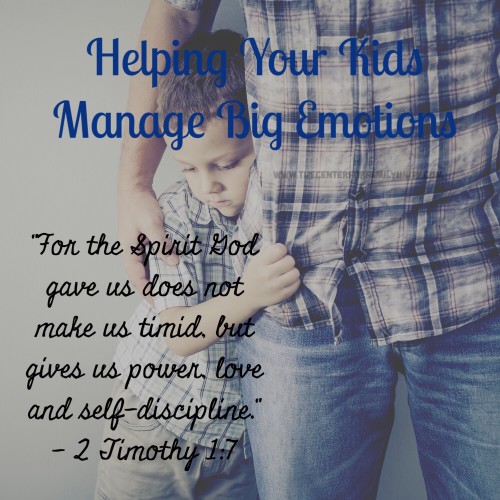Anxiety Disorders can be a true hindrance in a child’s home and school life. A child may become so distressed and uncomfortable that they begin to avoid activities and/or social situations. When a child experiences a major life change (what may seem major for a child is different than for adults), the foundations of their world are shaken. They can’t go shopping, meet a friend for a cup of coffee or schedule their own counseling appointments.
Our children depend on US to help them discover coping mechanisms. Anxiety is fear-based but God’s perfect love casts out ALL fear! The answer is our dependence on the Lord and our relationship with HIM. Our children depend on us to lead them through this process of depending on the Lord.
Here are some of the Signs and Symptoms of Childhood Anxiety:
- Clinginess
- Impulsiveness
- Irritability
- Distractedness
- Concentration or Focus issues
- Nervous movements or twitches
- Jitteriness
- Sleep problems
- Restlessness
- Sweaty hands
- Accelerated heart rate and breathing
- Nausea
- Headaches
- Stomachaches
- Excessive worrying
These symptoms can significantly affect a child’s daily life. It can lead to poor school performance, a lack of socializing, and significant discord in the household. The good news is that pediatricians and psychotherapists understand anxiety disorders and can provide treatment, educate parents, and help children feel better.
It is extremely common for anxious children to avoid talking about how they feel. They may worry that their parents won’t understand or they may fear being judged. This can lead to many children with Anxiety feeling alone or misunderstood.
Parents of anxious children have reported that they knew there was something different about their child, but did not realize it was an anxiety problem. Some parents wait for their child to “grow out of it” while others view the anxious behaviors as normal. As a result, parents of anxious children and teens often feel confused about what to do, as well as frustrated, and overwhelmed. Education is essential for parents.
Anxiety Disorders are believed to be a combination of biological and environmental factors. Stressful events may trigger anxiety but stress alone is not the cause of an Anxiety Disorder.
There are different types of Anxiety Disorders including Generalized Anxiety Disorder, Panic Disorder, Obsessive-Compulsive Disorder, Post-Traumatic Stress Disorder, Separation Anxiety Disorder, Selective Mutism, Social Anxiety Disorder, and Phobias.
- Generalized Anxiety Disorder (GAD)
A child with GAD will worry excessively about a variety of things, strive for perfection, and seek constant approval.
- Obsessive-Compulsive Disorder (OCD)
A child with OCD may experience unwanted and intrusive thoughts (obsessions) or feel compelled to preform rituals (compulsions) in order to reduce anxiety.
- Phobias
A child with an intense and irrational fear of strangers, heights, darkness, flying, animals, blood, insects, or being left alone. Children may often begin to fear a specific object or situation after having an upsetting or traumatic experience, such as a dog bite or a car accident.
- Separation Anxiety Disorder
Children, most commonly 7-9 years old, who experience significant anxiety when separated from parents and are extremely homesick. These children typically refuse to have sleepovers and may even refuse to attend school.
- Social Anxiety Disorder
A child that has intense fear of social or performance situations and activities. Social Anxiety can significantly impact academic achievement.
Separation Anxiety is extremely common in younger children, whereas adolescents tend to experience Social Anxiety.
If you review the disorders above you will notice threads of FEAR and feeling out of control.
Keep in mind that your child’s Anxiety disorder is not a sign of poor parenting. Anxiety can be successfully managed. Parents play a key role in helping their children manage their Anxiety. When coping skills and positive behaviors are rewarded and practiced in the home, children and teens can learn to face their fears, take reasonable risks, and ultimately gain confidence. Tools are important, however FEAR is a spiritual matter.
Here are a few verses from God’s Playbook of Life. Helping your children recite these gives them POWER and PROTECTION (remember it’s the sword of the Spirit in our armor):
Psalm 118:6
“The LORD is with me; I will not be afraid. What can mere mortals do to me?”
2 Timothy 1:7
“For the Spirit God gave us does not make us timid, but gives us power, love and self-discipline.”
I John 4:18
“There is no fear in love. But perfect love drives out fear, because fear has to do with punishment. The one who fears is not made perfect in love.”
Parents can help their children develop the appropriate skills and confidence to overcome their fears and anxieties. Children with anxiety can lead a full and happy life.
For help with your anxious child please call The Center for Family Unity, we specialize in helping you and your children 619-884-0601 www.TheCenterforFamilyUnity.com









